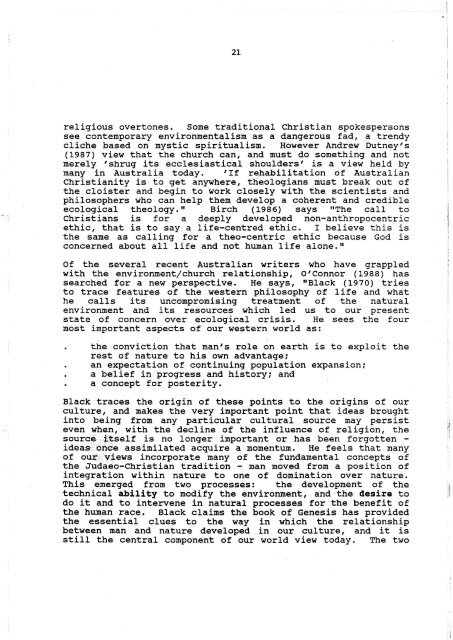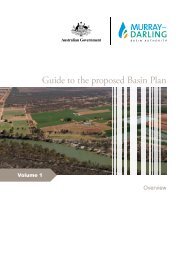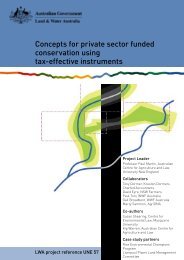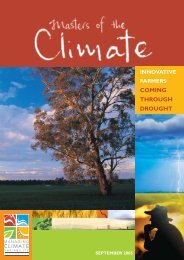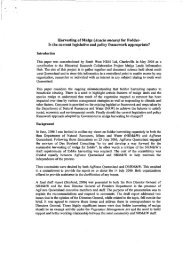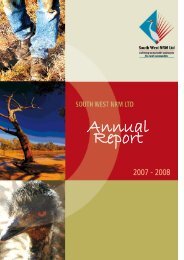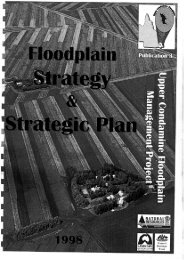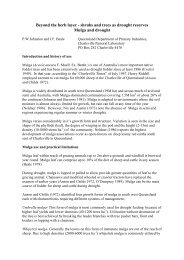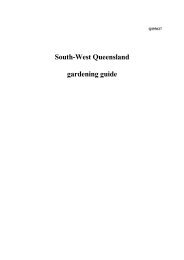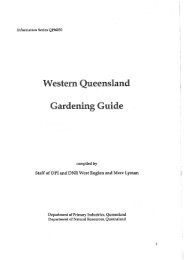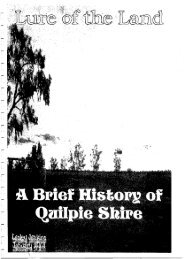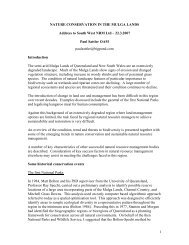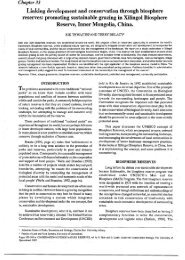soil-conservation-people-religion-and-land.pdf - South West NRM
soil-conservation-people-religion-and-land.pdf - South West NRM
soil-conservation-people-religion-and-land.pdf - South West NRM
Create successful ePaper yourself
Turn your PDF publications into a flip-book with our unique Google optimized e-Paper software.
eligious overtones. Some traditional Christian spokespersons<br />
see contemporary environmentalism as a dangerous fad, a trendy<br />
cliche based on mystic spiritualism. However Andrew Dutney's<br />
(1987) view that the church can, <strong>and</strong> must do something <strong>and</strong> not<br />
merely 'shrug its ecclesiastical shouldersu is a view held by<br />
many in Australia today. 'If rehabilitation of Australian<br />
Christianity is to get anywhere, theologians must break out of<br />
the cloister <strong>and</strong> begin to work closely with the scientists <strong>and</strong><br />
philosophers who can help them develop a coherent <strong>and</strong> credible<br />
ecological theology. Birch (1986) says "The call to<br />
Christians is for a deeply developed non-anthropocentric<br />
ethic, that is to say a life-centred ethic. I believe this is<br />
the same as calling for a theo-centric ethic because God is<br />
concerned about all life <strong>and</strong> not human life alone."<br />
Of the several recent Australian writers who have grappled<br />
with the environment/church relationship, 0'Connor (1988) has<br />
searched for a new perspective. He says, tlBlack (1970) tries<br />
to trace features of the western philosophy of life <strong>and</strong> what<br />
he calls its uncompromising treatment of the natural<br />
environment <strong>and</strong> its resources which led us to our present<br />
state of concern over ecological crisis. He sees the four<br />
most important aspects of our western world as:<br />
. the conviction that man's role on earth is to exploit the<br />
rest of nature to his own advantage;<br />
an expectation of continuing population expansion;<br />
a belief in progress <strong>and</strong> history; <strong>and</strong><br />
. a concept for posterity.<br />
Black traces the origin of these points to the origins of our<br />
culture, <strong>and</strong> makes the very important point that ideas brought<br />
into being from any particular cultural source may persist<br />
even when, with the decline of the influence of <strong>religion</strong>, the<br />
source itself is no longer important or has been forgotten -<br />
ideas once assimilated acquire a momentum. He feels that many<br />
of our views incorporate many of the fundamental concepts of<br />
the Judaeo-Christian tradition - man moved from a position of<br />
integration within nature to one of domination over nature.<br />
This emerged from two processes: the development of the<br />
technical ability to modify the environment, <strong>and</strong> the desire to<br />
do it <strong>and</strong> to intervene in natural- processes for-the benefit of<br />
the human race. Black claims the book of ~enesis has provided<br />
the essential clues to the way in which the relationship<br />
between man <strong>and</strong> nature developed in our culture, <strong>and</strong> it is<br />
still the central component of our world view today. The two


